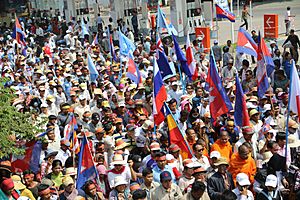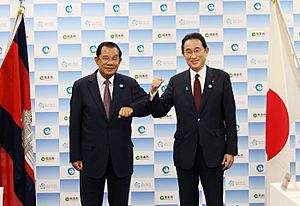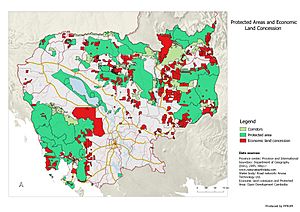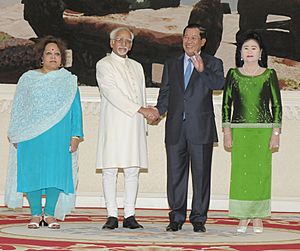Hun Sen facts for kids
Quick facts for kids
His Excellency
Samdech Akka Moha Sena Padei Techo Hun Sen
|
|
|---|---|
| ហ៊ុន សែន | |

Hun Sen in 2022
|
|
| 4th President of the Senate | |
| Assumed office 3 April 2024 |
|
| Monarch | Norodom Sihamoni |
| Vice President | Prak Sokhonn Ouch Borith Thun Vathana |
| Preceded by | Say Chhum |
| Prime Minister of Cambodia | |
| In office 30 November 1998 – 22 August 2023 |
|
| Monarch |
|
| Deputy |
See list
Sar Kheng
Hor Namhong (2004–2023) Tea Banh (2004–2023) Bin Chhin (2007–2023) Yim Chhaily (2008–2023) Men Sam An (2008–2023) Ke Kim Yan (2009–2023) Prak Sokhonn (2018–2023) Aun Pornmoniroth (2018–2023) Chea Sophara (2018–2023) |
| Preceded by | Ung Huot (as First Prime Minister) |
| Succeeded by | Hun Manet |
| In office 14 January 1985 – 2 July 1993 Acting: 26 December 1984 – 14 January 1985 |
|
| President |
|
| Deputy |
See list
Himself
(1984–1985) Bou Thang (1984–1992) Chea Soth (1984–1992) Sar Kheng (1984–1992) |
| Preceded by | Chan Sy (as Prime Minister of the People's Republic of Kampuchea) |
| Succeeded by | Norodom Ranariddh (as First Prime Minister of Cambodia) |
| Second Prime Minister of Cambodia | |
| In office 2 July 1993 – 30 November 1998 |
|
| Monarch | Norodom Sihanouk |
| Deputy | Sar Kheng |
| First Prime Minister |
|
| Preceded by | Office restored |
| Succeeded by | Himself (as Prime Minister) |
| President of the Cambodian People's Party | |
| Assumed office 20 June 2015 |
|
| Vice President |
|
| Preceded by | Chea Sim |
| Chairman of the Supreme Advisory Council of the King of Cambodia | |
| Assumed office 22 August 2023 |
|
| Monarch | Norodom Sihamoni |
| Minister of Foreign Affairs | |
| In office 1988–1990 |
|
| Prime Minister | Himself |
| Preceded by | Kong Korm |
| Succeeded by | Hor Namhong |
| In office 8 January 1979 – December 1986 |
|
| Prime Minister |
|
| Preceded by | Ieng Sary |
| Succeeded by | Kong Korm |
| Deputy Prime Minister of the People's Republic of Kampuchea | |
| In office 1981–1985 |
|
| President | Heng Samrin |
| Prime Minister |
|
| Member of the National Assembly | |
| In office 14 June 1993 – 2 April 2024 |
|
| Constituency | Kampong Cham (1993–1998) Kandal (1998–2024) |
| Personal details | |
| Born |
Hun Bunal
5 August 1952 Peam Kaoh Sna, Cambodia, French Indochina |
| Political party | Cambodian People's Party |
| Spouse |
Bun Rany
(m. 1976) |
| Children | 6, including Manet, Manith, and Many |
| Parents | Hun Neang Dee Yon |
| Alma mater | (Vietnam) National Academy of Public Administration |
| Awards | Grand Order of National Merit |
| Signature |  |
| Military service | |
| Allegiance | |
| Branch/service | |
| Years of service | 1970–1999 |
| Rank | |
| Commands | Democratic Kampuchea – Eastern Region |
| Battles/wars | Cambodian Civil War (WIA) Cambodian-Vietnamese War |
Samdech Hun Sen (/hʊn sɛn/; Khmer: ហ៊ុន សែន, UNGEGN: Hŭn Sên [hun saen]; born 5 August 1952) is a Cambodian politician, and former army general who currently serves as the president of the Senate. He previously served as the prime minister of Cambodia from 1985 to 1993 and from 1998 to 2023. Hun Sen is the longest-serving head of government in Cambodia's history. He is the president of the Cambodian People's Party (CPP), which has governed Cambodia since 1979, and has served as a member of the Senate since 2024. His full honorary title is Samdech Akka Moha Sena Padei Techo Hun Sen (Khmer: សម្តេច អគ្គមហាសេនាបតី តេជោ ហ៊ុន សែន [sɑmɗac ʔakkeaʔ mɔhaː senaː paɗəj tecoː hun saen]; meaning "Lord Prime Minister and Supreme Military Commander Hun Sen").
Born Hun Bunal, he changed his name to Hun Sen in 1972, two years after joining the Khmer Rouge as a soldier. He fought for the Khmer Rouge in the Cambodian Civil War and was a battalion commander in Democratic Kampuchea until defecting in 1977 and fighting alongside Vietnamese forces in the Cambodian–Vietnamese War. From 1979 to 1986 and again from 1987 to 1990, he served as Cambodia's foreign minister in the Vietnamese occupied government. At age 26, he was also the world's youngest foreign minister.
Hun Sen rose to the premiership in January 1985 when the one-party National Assembly appointed him to succeed Chan Sy, who had died in office in December 1984. He held the position until the 1993 UN-backed elections which resulted in a hung parliament, with opposition party FUNCINPEC winning the majority of votes. Hun Sen refused to accept the result. After negotiations with FUNCINPEC, Norodom Ranariddh and Hun Sen agreed to simultaneously serve as First and Second Prime Minister, until the coalition broke down and Sen orchestrated a coup d'état in 1997 which toppled Ranariddh. Between 1998 and 2023, Hun Sen led the CPP to consecutive and often contentious election victories, overseeing rapid economic growth and development, but also corruption, deforestation and human rights violations. In 2013, Hun Sen and the CPP were reelected with a significantly reduced majority amidst a resurgent opposition. Allegations of voter fraud and irregularities led to unprecedented anti-government protests. In 2018, he was elected to a sixth and final term in a largely unopposed poll after the Supreme Court dissolved the main opposition party, with the CPP winning every seat in the National Assembly. He led the country during the onset of the COVID-19 pandemic and Cambodia's third chairmanship of ASEAN; and, after the 2023 election formally announced his resignation as prime minister in favour of his son, Hun Manet. He remains as party leader and in 2024, was appointed president of the Senate, ensuring his continued influence over the country's politics.
Hun Sen has been prominent in communist, Marxist–Leninist, and now state capitalist and national conservative political parties, and although Khmer nationalism has been a consistent trait of all of them, he is thought to lack a core political ideology. He has been described as a "wily operator who destroys his political opponents" by The Sydney Morning Herald and as a dictator who has assumed highly centralized power in Cambodia and considerable personal wealth using violence and corruption, including a personal guard said to rival the country's regular army.
Contents
Early life and education
Hun Sen was born on 4 April 1951, in Peam Kaoh Sna, Kampong Cham as Hun Bunal (also called Hun Nal), the third of six children. His father, Hun Neang, had been a resident monk in a local Wat in Kampong Cham province before defrocking himself to join the French resistance and marry Hun Sen's mother, Dee Yon, in the 1940s. Hun Neang's paternal grandparents were wealthy landowners of Chinese heritage. His Chinese ancestry is at Zhuanshui Village, Tanjiang Town, Fengshun County.
Hun Neang inherited some of his family assets, including several hectares of land, and led a relatively comfortable life until a kidnapping incident forced their family to sell off much of their assets. Hun Nal left his family at the age of 13 to attend a monastic school in Phnom Penh. At the time, he changed his name to Ritthi Sen or simply Sen; his prior given name, Nal, was often a nickname for overweight children.
He graduated with a master in state administrative management from the National Academy of Public Administration of Vietnam.
Military career and entry to politics
When Lon Nol removed Norodom Sihanouk from power in 1970, Sen gave up his education to join the Khmer Rouge following Sihanouk's call to join the insurgency. Sen also claims he was inspired to fight against foreign interference when his hometown of Memot was bombed by U.S. aircraft in Operation Menu. Sen claims he had no political opinions or ideology at the time. As a soldier, he again changed his name, this time to Hun Samrach, to conceal his identity.
He changed his name to Hun Sen two years later, saying that the name Hun Samrach had been inauspicious and that he had been wounded several times during the period he had that name. Sen rapidly ascended ranks as a soldier, and fought during the fall of Phnom Penh, becoming injured and being hospitalized for some time and sustaining a permanent eye injury.
In Democratic Kampuchea, Sen served as a Battalion Commander in the Eastern Region, with authority over around 2000 men. The involvement or role of Sen in the Cambodian genocide is unclear, although he denies complicity. Human Rights Watch suggested he may have had a role in a massacre to suppress Cham Muslim unrest in September–October 1975, but Sen has denied this, claiming that he had stopped following orders from the central government by this time. Sen claims he had increasing disagreements with Khmer Rouge authorities in the administration throughout 1975–1977.
In 1977, during internal purges of the Khmer Rouge regime, Hun Sen and his battalion cadres fled to Vietnam. During the Cambodian–Vietnamese War as Vietnam prepared to invade Cambodia, Hun Sen became one of the leaders of the Vietnamese-sponsored rebel army. He was given the secret name Mai Phúc by Vietnamese leaders.
Following the defeat of the Khmer Rouge regime, Hun Sen was appointed as Deputy Prime Minister and Foreign Minister of the Vietnamese-installed People's Republic of Kampuchea/State of Cambodia (PRK/SOC) in 1979 at age 26. The Vietnamese-appointed government appointed Sen some authority over the K5 Plan, a Khmer Rouge containment strategy that saw the mass mobilization of civilian labor in constructing barricades and land mines, although the extent of his involvement is unclear.
First appointment as prime minister (1985–1993)
Hun Sen first rose to the premiership in January 1985 when the one-party National Assembly encouraged by politburo cadre Say Phouthang appointed him to succeed Chan Sy, who had died in office in December 1984. As the de facto leader of Cambodia, in 1985, he was elected as Chairman of the Council of Ministers and Prime Minister. Sen oversaw continuing conflict against several ongoing insurgencies during this period.
In 1987, Amnesty International accused Hun Sen's government of torturing thousands of political prisoners, using "electric shocks, hot irons and near-suffocation with plastic bags."
Paris Peace Talks and UNTAC (1991–1993)
As foreign minister and then prime minister, Hun Sen played a role in the 1991 Paris Peace Talks, which brokered peace in Cambodia and formally ended the Cambodian–Vietnamese War.
He held the position of prime minister during the United Nations Transitional Authority in Cambodia (UNTAC) until the 1993 UN-sponsored elections, which resulted opposition party FUNCINPEC winning the majority of votes with a hung parliament. Hun Sen and his party formally rejected the result. With the support of much of the state apparatus, including the army and police, Hun Sen and his deputy Norodom Chakrapong threatened to lead the secession of seven provinces and CPP-backed forces committed violence against UN and FUNCINPEC forces although Sen distanced himself from the secessionist movement a few days later. UNTAC and FUNCINPEC conceded a unique power sharing agreement with Hun Sen serving as Second Prime Minister alongside First Prime Minister Norodom Ranariddh.
Co-premiership (1993–1997)
1997 coup
In 1997, the coalition became unstable due to tensions between Ranariddh and Hun Sen. FUNCINPEC entered into discussions with the remaining Khmer Rouge rebels (with whom it had been allied against Hun Sen's Vietnamese-backed government during the 1980s), with the aim of absorbing them into its ranks. Such a development would have altered the balance of military power between royalists and the CPP.
In response, Hun Sen launched the 1997 coup, replacing Ranariddh with Ung Huot as the First Prime Minister and maintaining his position as the Second Prime Minister.
In an open letter, Amnesty International condemned the summary execution of FUNCINPEC ministers and the "systematic campaign of arrests and harassment" of political opponents. Thomas Hammarberg, then Special Representative of the Secretary-General for Human Rights in Cambodia, strongly condemned the coup.
Prime Minister of Cambodia (1998–2023)
In the 1998 election, he led the CPP to victory and forming a coalition with FUNCINPEC.
The elections of July 2003 resulted in a larger majority in the National Assembly for the CPP, with FUNCINPEC losing seats to the CPP and the Sam Rainsy Party. However, the CPP's majority was short of the two thirds constitutionally required for the CPP to form a government alone. This deadlock was overcome when a new CPP-FUNCINPEC coalition was formed in mid-2004, with Norodom Ranariddh chosen to be head of the National Assembly and Hun Sen again becoming sole prime minister.
Sen has opposed extensive investigations and prosecutions related to crimes committed by former Khmer Rouge leaders by the UN-backed Khmer Rouge Tribunal.
On 6 May 2013, Hun Sen declared his intention to rule Cambodia until the age of 74.
2013–2014 protests
After the July 2013 general elections both Hun Sen and his opponents Cambodia National Rescue Party claimed victory. In August, Hun Sen continued to pursue his aim of forming a new government. Cambodians in the United States, Canada and elsewhere, with hundreds of Buddhist Monks, peacefully protested in front of the United Nations in New York City on 19 August in opposition to Hun Sen's deployment of military and security forces in Phnom Penh, his unwillingness to share political power with opposition groups and seriously address earlier voting fraud and election irregularities.
One person was killed and others injured during protests in Phnom Penh in September 2013, where a reported 20,000 protesters gathered, some clashing with riot police. Following two weeks of opposition protests, Hun Sen declared that he had been constitutionally elected and would not step down nor hold a new election.
On 7 September 2013, tens of thousands of Cambodians, along with Buddhist monks and opposition groups, including Sam Rainsy's Cambodian National Rescue Party held mass demonstrations in Phnom Penh to protest the 28 July elections results which they claimed were flawed and marred by voting irregularities and potential fraud. The groups asked the United Nations to investigate and claimed that the elections results were not free and fair.
On 3 January 2014, military police opened fire at protesters, killing 4 people and injuring more than 20. The United Nations and US State Department condemned the violence. US Congressman Ed Royce responded to the report of violence in Cambodia by calling for Hun Sen to step down, saying that the Cambodian people deserve a better leader.
Consolidation of power (2015– 2023)
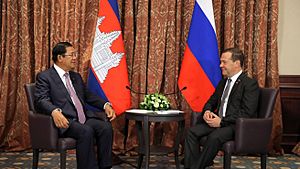
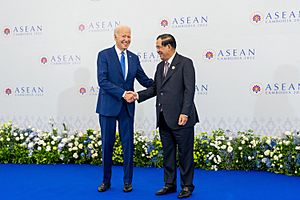
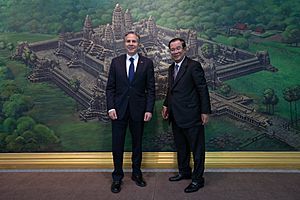
On 10 June 2014, Hun Sen made a public appearance and claimed he has no health problems. He warned that if he were to die prematurely, the country would spin out of control and the opposition could expect trouble from the armed forces, saying he is the only person who can control the army.
Following Hun Sen's orders, on 31 January 2017, the National Assembly voted unanimously to abolish the Minority Leader and Majority Leader positions to lessen the opposition party's influence. On 2 February 2017, Hun Sen barred the opposition from questioning some of his government ministers. Furthermore, Hun Sen vowed a constitutional amendment which later saw the opposition Cambodia National Rescue Party dissolved. This move led to the surprise resignation of opposition leader Sam Rainsy. The controversial law was passed on 20 February 2017, effectively granting the ruling party the right to dissolve political parties. Opposition leader Kem Sokha was later arrested for treason.
On 30 June 2018, weeks before the parliamentary elections, Hun Sen appointed his second eldest son, Hun Manet, into higher military positions. Some analysts had speculated Manet may be a future candidate for Sen's position. Hun Sen affirmed at the time that his son could become prime minister if elected rather than through direct handover, though he intends to rule until at least 2028.
The 2018 elections were dismissed as sham elections by the international community, the opposition party having been dissolved.
Hun Sen blocked the return of exiled Cambodia National Rescue Party leaders to Cambodia, including Sam Rainsy and Mu Sochua, in November 2019. He ordered the military to "attack" them on sight should they return, threatened airlines with legal actions for allowing them to board, deployed thousands of troops to the Thai and Vietnamese borders, and requested other ASEAN leaders arrest them and deport them to Cambodia.
In 2020, the European Union suspended its Everything but Arms preferential trade agreement with Cambodia due to concerns over human rights violations under Hun Sen's government. Sen criticized the move as "biased" and "unfair", including at the United Nations General Assembly in 2020.
During the early stages of the COVID-19 pandemic, Hun Sen downplayed the risk of the virus and declined to introduce preventative measures or evacuate Cambodian citizens from Wuhan during the initial outbreak in China. It was widely reported this was in an attempt to show solidarity with China, one of Cambodia's closest diplomatic and economic allies. Hun Sen visited China during the outbreak and offered to visit Wuhan specifically during its lockdown. In February 2020, at a press conference, he criticized the media for sensationalizing the virus, and threatened to expel those present who were wearing masks. Hun Sen was also present to welcome passengers of the MS Westerdam cruise ship to dock in Sihanoukville, after it was turned away from other countries. Cambodia started implementing preventative measures and travel restrictions from March 2020 as the pandemic spread globally.
A new State of Emergency Law prepared in response to COVID-19 granted Hun Sen further powers to restrict movement and assembly, seize private property and enforce quarantine. The new law has been criticised by Amnesty International for curbing human rights.
Ultimately, the government's successful vaccination efforts and pandemic response were viewed by the Cambodian public as contributing to the perceived legitimacy and effectiveness of the government. A study conducted by IEAS found that more than 80% of those surveyed approved of the government response, with more than 25% strongly approving of the response.
On 10 July 2023, Hun Sen warned Ukraine of using cluster munitions, saying "It would be the greatest danger for Ukrainians for many years or up to a hundred years if cluster bombs are used in Russian-occupied areas in the territory of Ukraine," Sen further cited his country's "painful experience" from the Vietnam War that has killed or maimed tens of thousands of Cambodians.
Following controversy over the 23 July 2023 elections, the King confirmed that Hun Manet would succeed Hun Sen as prime minister.
Corruption and land issues
Hun Sen and his family were estimated to have amassed between US$500 million and US$1 billion by Global Witness in 2016, and a number of allies have also accumulated considerable personal wealth during his tenure.
Hun Sen implemented land reform, the "leopard skin land reform", in Cambodia. Hun Sen's government has been responsible for leasing 45% of the total landmass in Cambodia—primarily to foreign investors—in the years 2007–08, threatening more than 150,000 Cambodians with eviction. Parts of the concessions are protected wildlife areas or national parks and have driven deforestation across the country. As of 2015, Cambodia had one of the highest rates of forest loss in the world. The land sales have been perceived by observers as government corruption and have resulted in thousands of citizens being forcibly evicted. According to Alice Beban, the land reform strengthened patronage politics in Cambodia and did not enable land tenure security.
Hun Sen was implicated in corruption related to Cambodia's oil wealth and mineral resources in the Global Witness 2009 report on Cambodia. He and his close associates were accused of carrying out secret negotiations with interested private parties, taking money from those who would be granted rights to exploit the country's resources in return. The credibility of this accusation has been challenged by government officials and especially Prime Minister Hun Sen, himself.
Human rights issues
Sen and the CPP were accused of orchestrating summary executions during the 1997 coup.
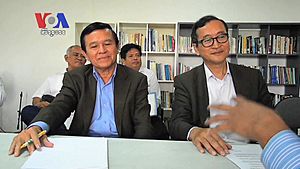
Hun Sen frequently calls for violence against his political opponents during seemingly irrelevant public events, often characterizing this as necessary to maintain peace and stability in Cambodia. In 2017, he said he would be prepared to "eliminate 100 or 200 people if they would destabilize the peace in Cambodia" while speaking at commemoration for his defection from the Khmer Rouge. In 2019, as opposition party leaders prepared to return to the country, Sen ordered the military to "attack them wherever you see them—you don't need arrest warrants at all" while speaking at a graduation ceremony for exceptional high school students in Phnom Penh. He also threatened the European Union if they withdrew a commercial deal: "If you want the opposition dead, do it. If you want it alive, don't do it and come and talk", although they did not give in. "We didn't pursue you because we didn't want to kill you at the time," Hun Sen said to opposition leader Sam Rainsy, although such death threats have not been implemented.
Hun Sen's Cambodian People's Party (CPP) has banned public gatherings, driven opposition supporters from the site of former protest meetings 'Freedom Park', and deployed riot police to beat protesters and detain union leaders.
Several Australian politicians, most prominently Gareth Evans and Julian Hill, have been highly critical of Sen and his government over human rights issues and have called for changes to Australia–Cambodia relations.
After the execution of 4 prisoners in July 2022 in Myanmar, Hun Sen warned to rethink the peace agreement if the regime continued to execute prisoners.
Foreign relations
Sen has frequently criticized Western powers such as the European Union and United States in response to their sanctions on Cambodia over human rights issues.
China
Sen strengthened a close diplomatic and economic relationship with China, which has undertaken large-scale infrastructure projects and investments in Cambodia under the Belt and Road Initiative.
During the COVID-19 pandemic, China provided major assistance to the Hun Sen government's vaccination campaign. As of early November 2021, China had sent more than 35 million vaccines to Cambodia. China provided many of them free of charge. Vaccines provided by China accounted for more than 90% of total vaccines provided to Cambodia from other countries. China also provided other health care supplies as well as medical professionals to Cambodia during the pandemic. In part thanks to Chinese contributions, Cambodia had the second-highest vaccination rate in Southeast Asia, despite having the second lowest per capita GDP in the region.
Thailand
Sen oversaw a number of diplomatic disputes with neighboring Thailand.
The 2003 Phnom Penh riots resulted in the ransacking of the Thai embassy in Cambodia, following false allegations that a Thai soap opera actress Suvanant Punnakant claimed that Angkor Wat belonged to Thailand. Sen called for a boycott of Thai goods and television shows and criticized the actress shortly before the riots. The riots and Sen's response severely damaged Cambodia–Thailand relations. Sen's Thai counterpart Thaksin Shinawatra closed the borders, expelled the Cambodian ambassador and evacuated Thai citizens from Phnom Penh in response. Thaksin also sent a warning to Hun Sen after witness reports suggested the army and police had not intervened until the embassy was destroyed. Sam Rainsy accused Sen of inciting the riot.
From 2008 to 2013, the Cambodian–Thai border dispute was an ongoing conflict, which on a number of occasions led to fighting between Cambodian and Thai forces. Sen and Thai premier Abhisit Vejjajiva negotiated a de-escalation on several occasions with the encouragement of ASEAN. Cambodia was granted sovereignty over the Preah Vihear Temple area by a UN court in 2013, ending the dispute.
Myanmar
- Further information: Cambodia-Myanmar relations
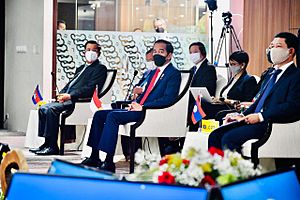
In his capacity as chairman of ASEAN, Sen became the first foreign leader to visit Myanmar following the 2021 coup d'état.
United States
In November 2016, Hun Sen publicly endorsed US Republican presidential candidate Donald Trump who went on to be elected president.
President of the Senate (2024–present)
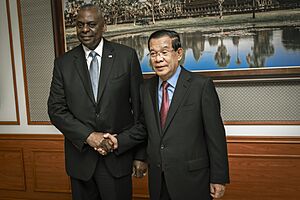
The Cambodian People's Party claimed an expected landslide victory in the 2024 Senate election, paving the way for Hun Sen to become its president when the new Senate convenes. He resigned from his National Assembly seat on 2 April, allowing him to take his seat in the Senate. The full Senate unanimously confirmed him as president on 3 April.
Control of media
Although Cambodia had relatively independent press during and immediately following the UNTAC era, Hun Sen and the CPP have since come to strictly control media in Cambodia. This has more recently encompassed social media, which surpassed traditional media as a news source for Cambodians in 2017.
Television, radio, and newspapers
Bayon Television is owned and operated by Hun Mana, Hun Sen's eldest daughter. Apsara TV is joint-owned by Say Sam Al, CPP Minister of Environment and son of Say Chhum, CPP secretary and the son of CPP Deputy Prime Minister Sok An. CTN, CNC and MyTV are all owned by Khmer-Chinese tycoon, Kith Meng.
CPP officials claim that there is no connection between the TV stations and the state. However, CPP lawmaker and official spokesman Cheam Yeap once stated "We pay for that television [coverage] by buying broadcasting hours to show our achievements".
A demand for television and radio licenses was one of 10 opposition requests adopted by the Cambodia National Rescue Party (CNRP) at its "People's Congress" in October 2013.
Radio stations were banned from broadcasting Voice of America and Radio Free Asia in August 2017. The country's most prominent independent newspaper Cambodia Daily was closed on 4 September 2017, a day after the main opposition leader Kem Sokha was arrested for treason. The Phnom Penh Post, another widely circulated independent newspaper, was sold to a Malaysian investor with ties to Hun Sen in 2018, which undermined its independence and aligned it closer to the government.
Personal life
Hun Sen is married to Bun Rany. They have 6 children, including one adopted daughter: Kamsot (deceased), Manet, Mana, Manith, Mani and Mali. The couple also adopted a daughter (who is not named in news media sources) in 1988, but they legally disowned her in 2007 for being lesbian. In 2010, Manet was promoted Major General in the Royal Cambodian Armed Forces (RCAF) and became the Deputy Commander of the Prime Minister's Body Guard headquarters. All three of Hun Sen's sons play big roles in his government. His older brother, Hun Neng, was a governor of Kampong Cham and a member of parliament.
Hun Sen is fluent in Vietnamese, in addition to his native Khmer. Hun Sen also speaks some English after beginning to learn the language in the 1990s, but usually converses in Khmer through interpreters when giving formal interviews to the English-speaking media.
Hun Sen is blind in one eye because of an injury he sustained during the fall of Phnom Penh while fighting for the Khmer Rouge. He is fitted with a Japanese made artificial eye, which is regularly replaced by Japanese doctors.
Hun Sen is a Buddhist. He has made major donations for the renovation of numerous pagodas, including Wat Vihear Suor.
Until June 2022, Hun Sen has used 4 April 1951 as his legal birthdate even if he was actually born on 5 August 1952. He had it changed due to a Cambodian superstition relating to having wrong legal birthdates causing conflict with the Chinese zodiac. A lot of Cambodians use two birthdates due to losing their birth certificates during the Khmer Rouge era of the 1970s. Hun Sen had it changed for believing the death of his brother in May 2022 due to a cardiac arrest was related to this superstition since he also had an incorrect birth date.
Honours
National Orders:
 Grand Order of National Merit (1996)
Grand Order of National Merit (1996) Grand Cross of the Royal Order of Cambodia
Grand Cross of the Royal Order of Cambodia Grand Cross of the Royal Order of Sowathara
Grand Cross of the Royal Order of Sowathara Grand Cross of the Royal Order of Monisaraphon
Grand Cross of the Royal Order of Monisaraphon Sena Jayaseddh Medal
Sena Jayaseddh Medal Medal of National Defense, with 2 gold stars
Medal of National Defense, with 2 gold stars Medal of National Defense, with 2 silver stars
Medal of National Defense, with 2 silver stars Medal of National Defense, with 2 bronze stars
Medal of National Defense, with 2 bronze stars Medal of Labour
Medal of Labour National Construction Decoration
National Construction Decoration
Foreign Orders:
- Brunei:
- Cuba:
- Laos:
- Philippines:
- Russia:
- Thailand:
- Ukraine:
 Member 3rd Class of the Order of Prince Yaroslav the Wise (Awarded by Volodymyr Zelenskyy, 30 December 2022)
Member 3rd Class of the Order of Prince Yaroslav the Wise (Awarded by Volodymyr Zelenskyy, 30 December 2022)
See also
 In Spanish: Hun Sen para niños
In Spanish: Hun Sen para niños
- Modern Cambodia
- Politics of Cambodia
- People's Republic of Kampuchea
- Kleptocracy
- Corruption


